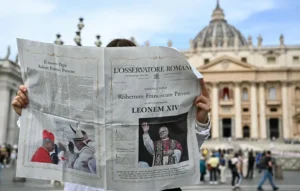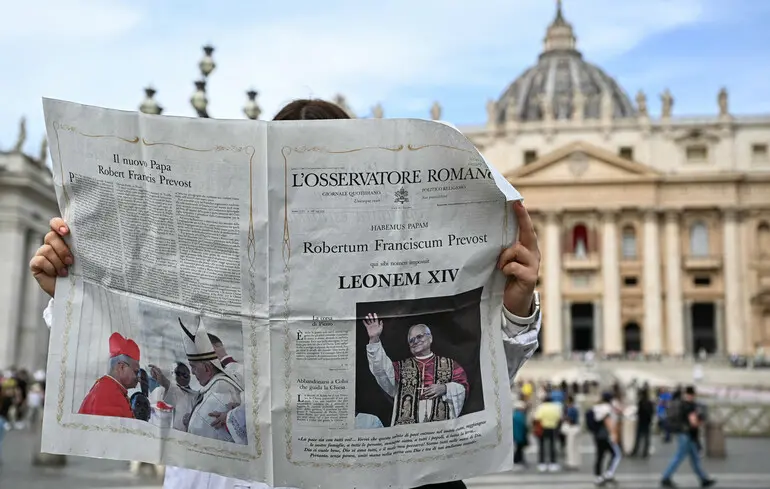 In a surprising turn for many, the new Pope—Robert Francis Prevost, a Peruvian bishop born in Chicago and the general of the Augustinian order—has ascended to the Holy See as Pope Leo XIV. He immediately declared his commitment to continuing the reform policies initiated by his predecessor, Pope Francis. Known as a skilled administrator and a balanced progressive, Pope Leo XIV’s defining trait is his missionary zeal. It’s likely that the conclave’s choice was influenced by this quality, as leading the Church requires more than just administrative prowess—it demands a fervent missionary spirit.
In a surprising turn for many, the new Pope—Robert Francis Prevost, a Peruvian bishop born in Chicago and the general of the Augustinian order—has ascended to the Holy See as Pope Leo XIV. He immediately declared his commitment to continuing the reform policies initiated by his predecessor, Pope Francis. Known as a skilled administrator and a balanced progressive, Pope Leo XIV’s defining trait is his missionary zeal. It’s likely that the conclave’s choice was influenced by this quality, as leading the Church requires more than just administrative prowess—it demands a fervent missionary spirit.
Numbers often provide a clear starting point, and for Pope Leo XIV, they are particularly fitting, given his background as a mathematician. The 267th Pope is the first from the United States and the first Augustinian to hold the position. Elected in the fourth round, his selection was notably swift, especially considering the unprecedented size of the conclave—133 cardinals, many of whom were unfamiliar with each other. Paradoxically, this lack of familiarity worked in Prevost’s favor. His deep knowledge and tireless work ethic, qualities appreciated by Pope Francis, allowed him to build connections with many cardinals during his tenure as head of the Dicastery for Bishops. Yet, he hadn’t been in the role long enough to make enemies within the Curia, which likely aided his rapid election.
At 70 years old, Pope Leo XIV aligns with the average age of the current conclave. He is young enough to implement the reforms initiated by Pope Francis but not so young as to embark on overly ambitious personal projects. In his inaugural speech, the visibly moved Pope recalled Pope Francis’ Easter blessing on St. Peter’s Square, given just before his passing, and expressed his desire to “continue this blessing.” Prevost’s alignment with Francis is evident not only in his cardinalship, bestowed by Francis, but also in his shared spirit and connection to the Global South. As a U.S.-born individual who consciously chose to serve in Peru, this region holds deep significance for him. During his address, he switched to Spanish to speak directly to his Peruvian flock, emphasizing his spiritual ties to the country.
Pope Leo also highlighted synodality, signaling his determination to complete the reform of Church governance started by Francis. However, he is not Francis. This was clear even before he spoke. When Leo XIV appeared on the balcony, he did so in full papal vestments, unlike Francis, who opted for a simple white cassock. Francis’ humility—marked by worn shoes, a Ford Focus instead of the Popemobile, and modest lodgings at Casa Santa Marta—remains uniquely his. As an Augustinian, not a Franciscan, Leo values discipline and tradition. His choice to embrace traditional papal symbols, which Francis eschewed, sends a message: Church traditions and discipline matter more to him than public popularity. This is a significant signal for the Church, reflecting his commitment to its foundational principles over fleeting trends.
Beyond appearances, Pope Leo XIV continues Francis’ focus on the poor. His chosen name, Leo, nods to Pope Leo XIII, the “Pope of the Workers,” who championed social justice and shaped the Church’s social doctrine. Prevost’s background as “Bobby from Chicago” has sparked varied reactions. Some speculate that the conclave was influenced by external forces, possibly linked to Donald Trump, to elect an American Pope. However, these claims lack substance. Critics of Trump argue that the election of an American Pope signals a decline in U.S. global influence, as the Vatican historically avoided American Popes to prevent amplifying U.S. political weight. Meanwhile, Trump’s camp has mixed feelings—while they see Prevost as a “Chicago guy,” they label him a “globalist” and “pro-migrant,” accusing him of being a counterweight to Trump’s influence.
Pope Leo XIV has shown little interest in emphasizing his American roots. Addressing the crowd in St. Peter’s Square, he spoke in Italian, Latin, and Spanish, underscoring his universalist vision and solidarity with the Global South. Like Francis, who never visited his native Argentina during his papacy and saw his support there wane, Leo may face similar challenges in his homeland. As the saying goes, “A prophet is not without honor except in his own country.”

